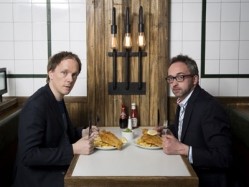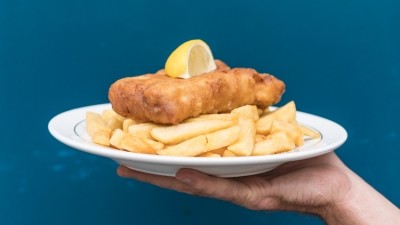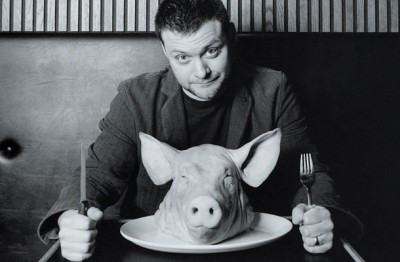Business Profile: Kerbisher & Malt

Kerbisher & Malt’s Saul Reuben isn’t the first ‘proper’ chef to open a fish and chip shop, and he certainly won’t be the last. Rick Stein runs two successful fish and chip shops in Cornwall, former The Ivy head chef Des McDonald recently opened a flash chippy in Islington and Mitch Tonks alumnus Garry Rosser’s The Scallop Shell in Somerset has picked up a slew of awards since it opened in 2012.
But it doesn’t always turn out so well. Mark Hix admits to losing a small fortune on an ill-conceived fish and chip shop in Maida Vale in the early noughties and Tom Aikens famously shut his eco-friendly Chelsea chippy in 2011 after taking something of a battering from the critics and the restaurant’s wealthy neighbours, who objected to the smell.
The key problem, explains Reuben’s brother-in-law and business partner Nick Crossely, is that experienced chefs have a tendency to wander off brief. “They fiddle with the concept and sneak in other items – a little crab salad, or maybe a grilled lobster. Very soon you’re running a seafood restaurant, not a chippy. Also, chefs often charge too much – not many people are willing to pay £18 for cod and chips.”
Founded back in 2011 in Brook Green, the well-heeled leafy neighbourhood that runs between Hammersmith and Shepherd’s Bush in West London, Kerbisher & Malt is an exercise in restraint. Reuben may have worked at The OXO Tower and under Henry Harris at Racine but save the odd foodie-flourish – there’s a fennel and dill salad and the onion rings are pickled prior to being deep-fried – there’s little on his menu that would raise eyebrows at a regular chippy. Prices are extremely reasonable to boot, with cod and chips for less than £8 and a fish finger butty, yours for just £4.
“I thought there was a gap in the market for good fish and chips, and Saul agreed. In London, fish and chips is usually bog standard and the places that serve it often do kebabs, chicken and pizza too,” says former city worker Crossley. “We’ve never claimed to reinvent the genre - we just do a simple thing well and we don’t take any shortcuts. People still refer to us as ‘that posh chippy’, though.”
Adaptability
Earlier this year the pair launched a restaurant in Clapham’s affluent Abbeville Village bringing their West London estate of new-wave fish and chip shops (a term coined by Restaurant columnist Tony Naylor, as it happens) to four. Later this summer, a branch will open close to independent restaurant and street-food hotspot Exmouth Market in Clerkenwell and Crossley and Reuben are close to signing on two additional sites, one of which is in Notting Hill.
Kerbisher & Malt’s adaptability has been a major factor in its success. As a small business funded through a network of family and friends securing bricks and mortar has been tough. As such the pair’s property strategy is to pick up sites that aren’t of much interest to anyone else and make them work. Like most fish and chip joints, takeaway is an extremely important part of the overall sales mix – up to 50% at some branches – so the pair targets areas with a strong residential catchment.
The branches offer the same menu, but the size, feel and service style differs from branch to branch according to the space available and the area’s demographic. For example, the original branch in Brook Green is a counter-ordering affair while the rest of the estate offers table service.
The number of covers varies considerably, too. The Ealing restaurant seats 60 but the group’s upcoming Clerkenwell branch is a former kebab shop and offers a paltry 500sq ft of trading space. Kerbisher & Malt’s first site outside of West London will be takeaway focused, containing only a communal table for 10 people.
One area where Kerbisher & Malt does differ from a common-or-garden chippy is design. Last year the group’s restaurant in Ealing won Best Fast/Casual restaurant at The Restaurant & Bar Design awards. Crossley – who runs an independent film distribution business and charity alongside Kerbisher & Malt – and Reuben worked with emerging design agency Alexander Waterworth to create a bright, modern look in the branches and commissioned a company that specialises in film poster design to come up with their group’s quirky branding.
“Perhaps the only thing that the restaurant business has in common with the film business is that you only have one chance to make that initial splash,” says Crossley. “The branding and the look of the restaurants was critical.”
Sustainable sourcing
Prior to opening the first Kerbisher & Malt, Reuben engaged in some light industrial espionage, working in two fish and chip shops in the north and south of the country and spending time with some North Sea fishermen to better acquaint himself with his raw material.
“There are of course some gems out there but, in general, fish and chip shops tend to be run by those who aren’t chefs or food people. There is a culture of cutting various corners to maximise profitability,” says Crossley.
Potatoes are routinely bought in pre-chipped and treated with a preservative called Drywite, which stops cut chips from oxidising. Most of the fish served has been frozen, Crossley says, and the practice of pre-cooking it and holding for extended periods of time means it is often served dried out.
Other common money-saving tactics include a suspicious starchy mixture containing green dye standing in for proper mushy peas, the use of a cheapo just-add-water batter and the dispensing of watery generic condiments.
Running a good chippy certainly isn’t rocket science. There’s no secret to Kerbisher & Malt’s excellent rapeseed oil-fried chips – the correct variety of potato is peeled, chipped and immediately blanched before being chilled quickly and held until the final cooking process. It’s the omission of the chilling stage that is usually the culprit for soggy chips.
Fish is served battered, grilled or in matzo meal. As one would expect cod and haddock are the big sellers but plaice, pollock and coley are also available. Kerbisher & Malt sources most of its fish from two suppliers in London’s Billingsgate Fish Market, although it does sometimes work with smaller coastal suppliers.
“We’re buying large quantities and need the same fish. We can’t always use the outfits that service the sort of restaurant that can say ‘what’s good today?’, ‘oh yes, we’ll have some of that, then’. We get certificates from suppliers to prove the fish is from a sustainable source,” says Crossley, whose brother Dan happens to be head of the Food Ethics Council.
With menu prices fixed, the daily fluctuations in white fish prices are tricky to manage. Crossley and Reuben soften the hit they occasionally take by ordering fish whole – the offcuts are used for homemade fish fingers and fish bites for kids – and prepping all the company’s fish in its Ealing branch to reduce labour costs.
Fish and chips
Crossley is realistic about the inherent limitations of running a fish and chip chain. “I’m not sure if the high street is ready for a national fish and chip group. If it were viable, Gondola or one of the other groups would have already done it.
“It’s not really an all-day dining concept and spend per head is low. Diners don’t select chippies like other restaurants, the thought process is more: ‘I fancy fish and chips, where’s a good one?’. Footfall isn’t that important to your average chippy.”
That’s just as well, as Kerbisher & Malt clearly can’t compete with the big shown that our take on it also works.”

















